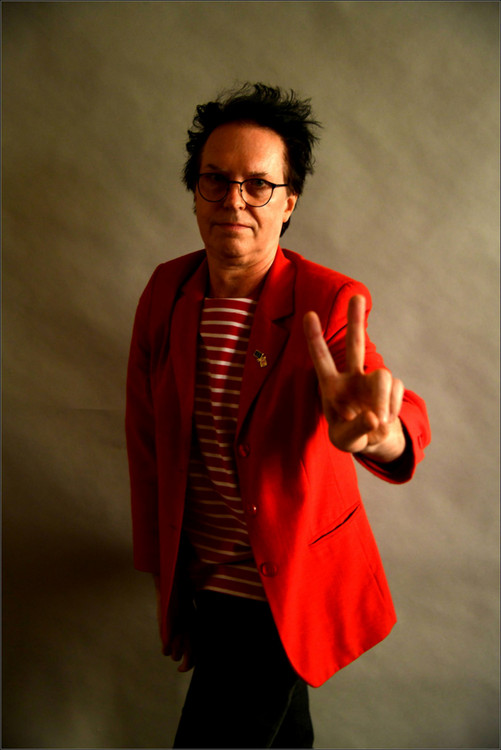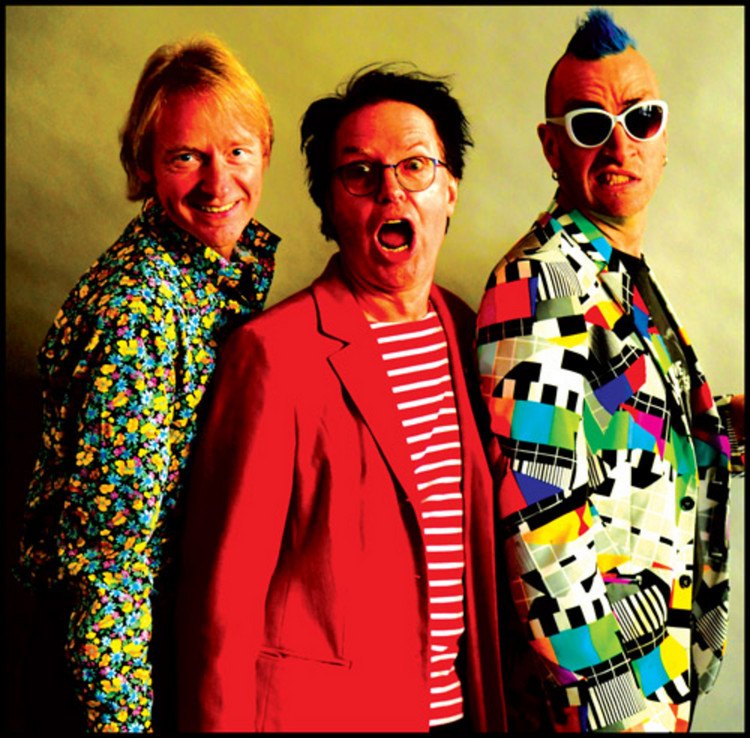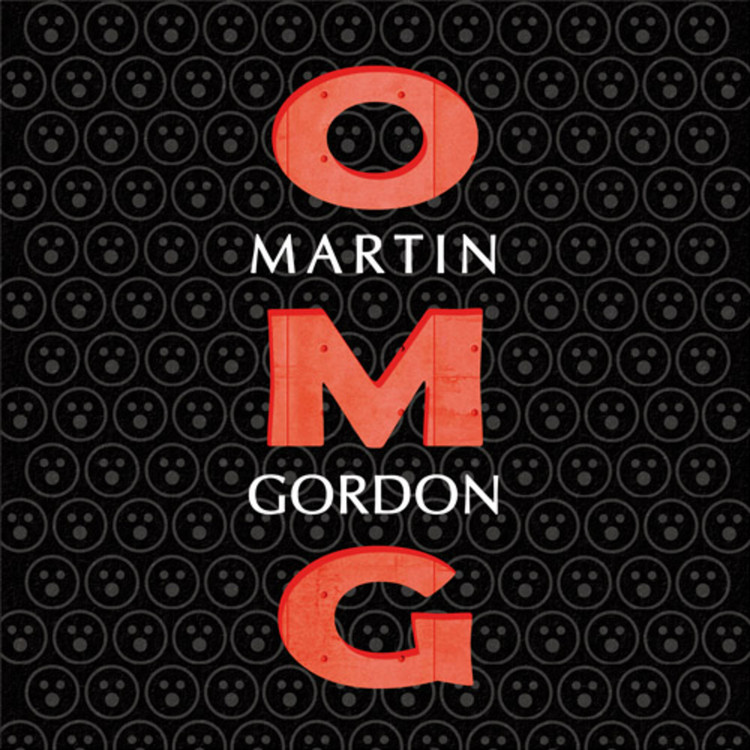
MARTIN GORDON INTERVIEW

Outline’s Steve Plunkett caught up with Suffolk born bass guitarist, keyboard player, producer and session musician, Martin Gordon. He has played around the world with some of the biggest musical stars from Sparks to George Michael, Boy George, Blur, Primal Scream and even Kylie Minogue. He has also played in hisown band Radio Stars and John’s Children (Marc Bolan’s first band).He currently resides in Berlin, Germany.
In 2009, he was described by Classic Rock magazine as being “like Brian Eno fronting 10cc at a cleverness convention”. He has just released a new album ‘OMG’ and quite remarkably it’s his ninth to date, but more of that later.
Martin, so where do we start on your glittering career? I personally came across you as a twelve year old when I purchased Sparks’ third album, Kimono My House (he is on the front cover) and I have had a bit of a fixation with them and that album cover ever since, so do you mind if we start there please?
Yes, I remember them well. It was my first band, so everything that happened I figured was an example of how things were meant to be. I swiftly (well, OK, not that swiftly) discovered that it was not the case at all. I was so pleased to be playing with very some competent musicians, and I was also ecstatic to set foot in the hallowed Basing Street studios, and to meet and hang out with all those legendary Island musos – Free, Mott the Hoople, Traffic et al.
So tell me about that rather now legendary first ever Top of The Pops experience, when Sparks debuted ‘This Town Ain’t Big Enough For Both of Us’.
Well, it’s been told before, but the band turned up at White City, the Americans were overheard discussing having a nice day in the country of Yurp and then we were chucked out because the Muricans didn’t have work permits. So the next week we had another go, this time with the relevant documentation for foreigners, and it all went off OK. Then I waited at the bus stop in the rain to get to Kings Cross for the train back to Hitchin, as other members glided off in cars with smoked windows. My, how we laughed at the merry jape. It was probably a situationist prank on the theme of the impossibility of true equality in art.
I understand that you were rather harshly fired from the band just a short week later, what on earth happened? Were you really dismissed for reading the newspaper while rehearsing!? That seems a bit harsh doesn’t it?
Well, it was the Telegraph, you see. These days I would completely understand but back then, when we didn’t actually know that foreigners were the root of all evil, we had to get our information somehow. Anyway, reading the paper was probably more compelling than playing ‘Equator’ for the 34th time in a damp basement with a single bar electric fire, although the high humidity did make turning the pages over rather tricky.
Reading your biography, I saw that you only made one album with them. Do you wish that you had done more with them?
Let me answer your question in this way. I can think of more things that I wish I could have done with them, yes.
What memories do you have from making that album and working with Ron and Russell Mael?
I remember Paul Kossoff (of Free) wandering in to pass the time of day in Basing Street, Roger Daltrey dropping by in Battersea to make tea, Overend Watts (of Mott The Hoople) at Air in Oxford Street giving me tips on how to compress the lows but only limit the top end of the bass. This made no sense at all unless you were playing a stereo instrument, of course, but I was. The band was impressive in rehearsals and, with the assistance of a good team (including Richard Digby Smith, known in those far-off days as Diga), we managed to capture most of it in the more clinical surroundings of the studio. At some moments, it sounded like a proper rock band, which was quite my thing at the time.
Did you get to tour with them or play any gigs?
No. The band rehearsed for a live show, but bass issues presented themselves, and poof!
Are you surprised that they are still making music and playing live?
Yes, jolly well done them, I say. Such ambition must bring joy to seniors the world over, showing clearly that life does not stop at 70, but that you can carry on being young regardless of chronology and still dance fishily. There is a message there for all of us, I believe. Well, most of us. Some of us.
Do you have any contact with them still?
No.

I can see that you were originally from Suffolk, do you still have family there and still visit East Anglia at all?
My grandparents used to live in March, Cambridgeshire and we would often visit. I lived with them for a year as a toddler, in Deerfield Road. But those are far-off times. I did like East Angular – very flat – but I haven’t been there for many a year.
Tell me more about playing in John’s Children, how different was that compared to the Sparks experience?
At that time, which was the second incarnation of JC, if not the third, it was actually Jet (or Radio Stars, depending on how you define it) with a couple of different people present / missing. It was far less serious, I will say that. We had serious fun around Europe for a couple of years.
Marc Bolan had obviously played in the band, was there much of his spirit left in the band by the time that you arrived?
No, it had all been drunk by then. Badum tish. We did a couple of Marc tunes in Jet, and also in Radio Stars, so there has been a fairly consistent Marc-connection over the years. I was quite a Tyrannosaurus Rex fan so, when we did his TV show that was a highlight. And I covered an old T. Rex tune on my first solo album, ‘Warlord of the Royal Crocodiles’. Crocodiles, royal or otherwise, were an increasing problem in London at the time, and caused downright havoc in many a rehearsal room, as you can imagine. It was the lashing tails that were the real problem, I knew exactly where Marc was coming from on this one.
What was it like coming away from that period of ‘glam’ with Sparks and Johns Children to then be a founding member of Radio Stars and play in amongst that post punk / new wave era? How was the transformation for you?
Very easy, as all we did was change the trousers. Some of us went so far as to adopt ‘new’ hairstyles as well, but others of us just didn’t bother. In fact, there was not such a vast difference between the music we performed in Jet and that of Radio Stars. The tempos were upped a bit, and the keyboards unceremoniously slung out, but otherwise things went on as normal. Of course, the infamous Sex Pistols / Bill Grundy interview did make a big impression on everyone. I remember being at Island Hammersmith watching a re-run of the event with a large group of people, and it was a watershed moment. When rehearsals resumed, things were inevitably faster, as a result. Radio Stars ended up on a ‘punk’ record label, so people had a pre-conceived view before they even heard the music, I suppose.
Do you think that Radio Stars deserved more recognition for their work from that period? Or are you happy at the mark that you made?
I’m happy that anyone remembers it, to be honest. It was what it was, at the time. It was interrupted by peculiar career decisions on the part of some, but what isn’t?
Have you checked out the band’s performance recently, from the Old Grey Whistle Test with whispering Bob Harris?
Indeed, it’s pretty good. Imagine playing live on TV without a safety net. Tell that to the kids of today, and they won’t believe you.
You have worked around the world in some amazing countries including Turkey, France, Bali, Egypt, the Gambia, Ghana, India, Morocco and Pakistan. Tell me about some of the highlights from those experiences. What stands out for you?
Most recently, putting an ensemble together for a concert in The Gambia last December. Rehearsals in Senegal, one day’s full rehearsal in The Gambia and then on stage playing bass with the Ensemble Modern and Winne & Rimme and then conducting the assembled musos through an orchestral piece. Other earlier highlights must include being arrested by armed soldiers in Morocco and driven at high speed to a remote walled ‘facility’ in the desert, where it turned out, to my relief, that a lady I had met earlier had organised the whole thing. The daughter of a high-ranking officer, she was waiting for me with mint tea. And in Pakistan, (then-prime minister) Nawaz Sharif’s bodyguard held me up at gunpoint, aiming his machine-pistol at my head while angrily enquiring whether I drank Pakistani water. “Of course”, I reassured him, “it’s the finest water in the entire world!” He let me go. It was all in a day’s work.
What was it like working with the legendary Hindi film singer Asha Bhosle, who is immortalised in Cornershop’s, Brimful of Asha?
She was very nice, tended to be the grande dame occasionally so I was deputed to distract her and calm her down from time to time. A fabulous singer, as is her sister Lata Mangeshkar. A most enjoyable three months in Juhu, Bombay.
Tell me more about playing with the Rolling Stones, how did that come about? What was your input?
Well, a friend in the band I was producing in Paris knew someone in the Stones team, and I just happened to be there at the right time. I volunteered my services when their bass player didn’t show up, and they asked me back a couple of times. A brief glimpse through the keyhole into another world. I tell the story on my website (martingordon.de/rollit) so I won’t burden you with it, but suffice to say that I wish I had been a bit quicker off the mark in responding to Jagger’s request to have a word.
What made you move to Berlin, Germany? What to do like about the city?
It was the power of luuuurv but, as these things tend not to, it didn’t last. Berlin is green, open and has relatively few people living in it, compared to London. 10 minutes away from me there’s a forest, a lake and a beach. On the downside, it’s full of Germans with their right trouser leg rolled up.
Is it home now for good? Could you see yourself ever coming back to the UK to live?
It is, and I cannot. I’m a European, so that’s that, at least for the foreseeable future.
You are about to release your new album in June, your 9th solo album in total. Was it recorded in Berlin?
Yes, it was recorded on a boat where I’ve recorded many times – All Around Music in Treptower Park. Unfortunately, developers have come along with their unerring nose for profit – now the mooring has been snapped up, and the owner has had to discontinue both living and working on his two ships. No doubt tourists will be welcome in this location in the future, but probably not very.
What was the inspiration? Is there a particular theme rising through the twelve tracks?
As ever, it’s human foolishness. But since OMG was concluded, even more riveting examples have arisen, such as 5G-COVID conspiracy theorists. Who knows what the current scenario may lead to? I keep an eye on the Darwin Awards site, just to remind myself that the human condition is both pandemic and perennial.
Are you planning on touring the album around the planet, once the Corona Virus lifts its ugly head?
Around the planet and beyond. Will things ever return to the way they were? It seems unlikely, right now. I do know that I’m not terribly interested in seeing Mick Jagger’s front room as the backdrop to some seriously synchronised miming, that’s for sure. I’ll probably develop the bicycle-based model (but not that kind of model), whereby gigs are selected by ease of access to a bike lane. I experimented with the non-bike streaming model, but I doubt that it’s got legs (not those kind of legs). That was a rendition of ‘Somewhere Over the Rainbow’ in Eb which is, according to those who know about this sort of thing, the second-saddest of all keys. But one day in the not-too-distant future, we will once again take our rightful place on a stage, I am sure.
And the original, for those interested in rather heavy-handed subbing.
